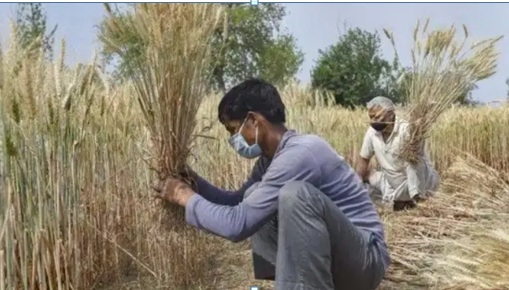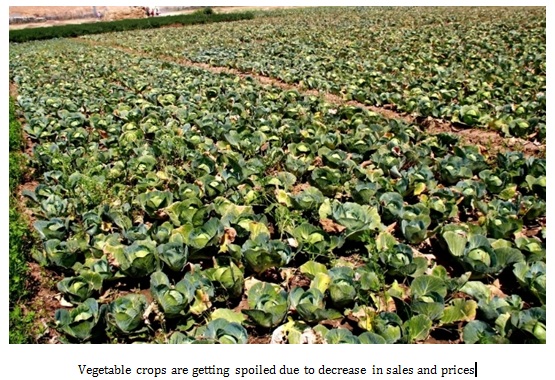By Dr. S. Naresh Kumar / Dr. Om Prakash / Jitender Kumar Gupta
The Covid-19 epidemic is spreading rapidly across the country and the number of patients infected with corona virus is increasing. India has done a great job so far in keeping these numbers low, relative to other countries. However, the indirect impact of this infection is on the farmers and crops. During March and April, crops usually get ready to be harvested in most parts of the country.
However, due to the fear of virus infection and lockdown, farmers have been facing many problems in harvesting and marketing the crop produce. A quick view of the issues faced by the farmers of Bundelkhand region (Jhansi and Niwari districts) along with their response to situation as well as Government interventions by a team of Indian Agricultural Research Institute (ICAR) led by Dr. S. Naresh Kumar and his team Dr. Om Prakash and Jitender Kumar Gupta could see the ground level impact in some villages of Bundelkhand region.
Covid-19 impact in villages
- The crop harvest is delayed due to non-availability of labour as a consequence of nation-wide lockdown.
- Threshing machines come to Bundelkhand region mostly from areas like Punjab, Haryana and Rajasthan during the wheat harvesting season to work on rent but, due to lockdown the threshing machine could not reach in time.
- To save crop from wastage, farmers are trying to harvest and transport themselves.
- After harvesting, they are also facing issues in storing the produce, transporting it to markets and selling it. During the first phase of lockdown farmers could not even get the means of transportation to take them to markets.
- In such a situation, farmers are looking for options to sell the crop directly from the farm field, so that they can get some money for their produce.
Pradhan Kaushal Nayak and wheat farmers of village Pathari in block Babina of Jhansi district say that this is the season for harvesting of crops like wheat and gram, while the harvesting of mustard crop was over before lockdown. In fact, the absence of laborers forced many farmers to harvest the crop by involving entire family members and by taking help from neighbours. But due to lack of transportation, they could not sell the crop.
In case of vegetable crops, major varieties such as cauliflower, cabbage, brinjal, okra, pumpkin are drying in the fields. Due to the closure of routes leading to vegetable markets, farmers have left the vegetables in the fields unharvested. In normal course, vegetables from Jhansi used to go to distant places such as Agra, Banda, Mahoba, Gwalior and Jabalpur. But the lockdown made it virtually impossible to transport the vegetables to distant places, while buyers too could not reach the villages. Farmers are left to face economic strides in their villages.
Decrease in sales and prices
In another village, NayaGaon, of the same block, the farmers shared their issues related to animal husbandry. Rajesh Rai and other livestock owners say that the price of animal feed such as khali (oil cake) has gone up by Rs 200 to Rs 300 per bag. For instance, a bag of oil cake which was available earlier at Rs 1,400 has now become Rs 1,600. In the same vein, the Chokar (wheat bran) which was Rs 850 is now available for Rs 1,100. On the other hand, prices of milk have decreased, causing further economic loss to farmers. Closure of sweet shops and hotels has also led to a huge reduction in the demand for milk. The milk which was earlier sold at Rs. 45 to Rs. 50 per liter, is now sold barely at Rs. 25 to Rs. 30 a litre.
Despite all these hardships, farmers have shown exemplary resilience following the coronavirus directions to keep social distance, wear masks and sanitize hands frequently. They started harvesting crops themselves. Soon, the government has exempted the agricultural related activities from lockdown restrictions.
This has greatly helped them to access the harvesting machines, labour, local transport and markets. Machines related to harvesting, such as Combined Harvester, Reaper is able to move from one state to another for meeting the harvesting demand in a short duration. Harvesting was done even during nights to maximize the machine availability.
Opening of government markets, agricultural production market committees and those mandated with agricultural products as listed by the authorities enabled farmers to access fertilizers, seed and chemical pesticide shops for maintaining their standing vegetable crops in tact and to plan for ensuing kharif season. The Government has allowed movement of people engaged in crop harvesting and those in procurement of crops at minimum support price. In addition, opening of Custom Hearing Centers helped them to prepare value added products.
Govt relief efforts
In addition to all these, under the PM Kisan Samman Yojana, registered farmers got an installment of Rs. 2,000 in the first week of April. This amount provided instant financial relief in the midst of Corona crisis. Under the Pradhan Mantri Ujjwala Yojana, the Centre has decided to provide free gas cylinders to the beneficiary women for three months. Farmers in these villages already started getting these benefits. Due to the above facilities and financial relief that is being provided by the government to farmers, despite the lockdown, they are able to carry on agricultural work with relatively less hardship.
Among other facets of village activities, education of school and college going children is largely affected as many of them do not have smartphones, the internet connectivity is limited and know-how on use of online or e-learning platforms is also limited.
The Indian Council of Agricultural Research and Indian Agricultural Research have issued advisories to farmers to use machines for harvesting and threshing. A precautionary advisory is made for the use of farm equipment, so that more people will not gather for farm operations; and if possible, engage people only familiar to the farm work to prevent any Covid-19 infection from outsiders. These guidelines along with the Covid-19 prevention measures helped farmers to carry on farm operations without much hindrance.
Guidelines to farmers
The ICAR-Indian Agricultural Research is implementing the climate resilient technologies in six villages of Jhansi (in UP) and Niwari (in MP) districts under the project entitled ‘Agricultural Productivity in Climate Change Scenarios: Impacts and Adaptation Pathways’. On-station project personnel have been providing the information to farmers of Bundelkhand region on precautions to be followed for prevention of Corona virus. The precautions advised to farmers in these villages while performing the agricultural operations such as harvesting or threshing include:
- Maintain social distance (i.e. at least 2-meter distance between each other),
- Do not employ more workers in the field simultaneously,
- Do not drink water from the same bottle used by others,
- Use your own farm implement or wash it before and after use, if borrowed from others,
- All working persons / workers have to ensure that they work only by wearing home-made masks,
- All must wash their hands frequently with soap for at least 22 seconds,
- If crop is harvested, then store the produce in dry place,
- Do not indulge in panic selling, as there may be a possibility of getting lower price,
- Keep emergency numbers of your district officials (agriculture, health, etc) with you,
- The most important thing is to take care of health of yourself and your family, and
- Do not litter and do not defecate in the open.
Future challenges and opportunities
The recent developments also lead to the return of villagers who migrated to cities for jobs and livelihood. Currently, these are under quarantine at centers located in district headquarters. This ‘Reverse Migration’ will pose new challenges and also provide opportunities in rural areas. Over 2 million people are likely to return to their villages across the country, though it may not be a huge number in a country that has about 1.3 billion people. Many may return to their earlier jobs in cities but surely some will stay back due to the family and social pressures.

It is important to provide opportunities to start their own small business or ventures of their expertise in the village or cluster of villages. Agricultural activities such as farm mechanization, value addition, processing, grading, packing, transportation and marketing can attract these relatively skilled force. Some can also form the groups to start agricultural services such as supplying inputs (both material and knowledge) to farmers, provide market information and act as output managers. Thus a few in the village can act as the‘input-output service provider’.
In addition, the rural infrastructure needs to be given emphasis. This includes providing threshing platforms, village level storage facility, facilities for development of value added products, etc. The internet facility and some ICT facilities are needed for developing online learning facility within the village. This facility can be used by all villagers (including students) for learning and communication. For all these, the government, industries (under corporate social responsibility), NGOs and individuals can join hands to make rural India vibrant.
Time to build future vibrant rural economy
The current crisis has made us all realize that too much human perturbation has taken place in ecosystems leading to their degradation. Globally, we have been experiencing cleaner air, cleaner water and more activities of other living beings (birds, animals) due to the restrained activities of humans under Covid-19 threat. Hence, these ‘forced learnings’ must not be wasted. It’s time to rethink about designing the future development pathways that are in harmony with ecosystem sustainability so that plant earth becomes more sustainable.
All the initiatives must take ecosystems sustainability more seriously. In agriculture, for example, ecosystem based approach and solutions must be given priority. In energy sector, the renewable energy sources and developing energy use efficient technologies become important. While doing so the waste generated (eg. batteries) must not pollute the ecosystems. Similarly, in real estate sector, designing and constriction of energy efficient buildings must be given the priority. So let us think and act for a green and clean bright future of the planet earth.
(The writers are scientists from the Indian Agricultural Research Institute (ICAR), New Delhi.)

